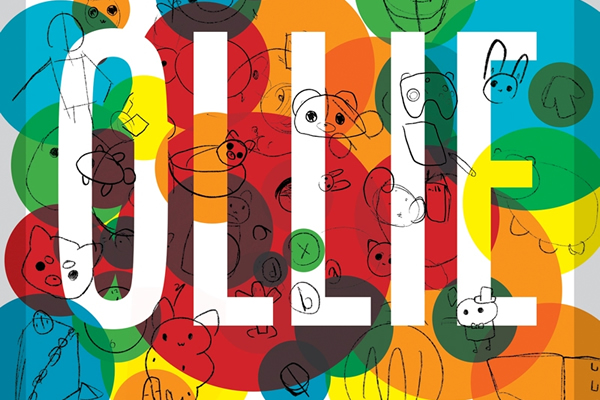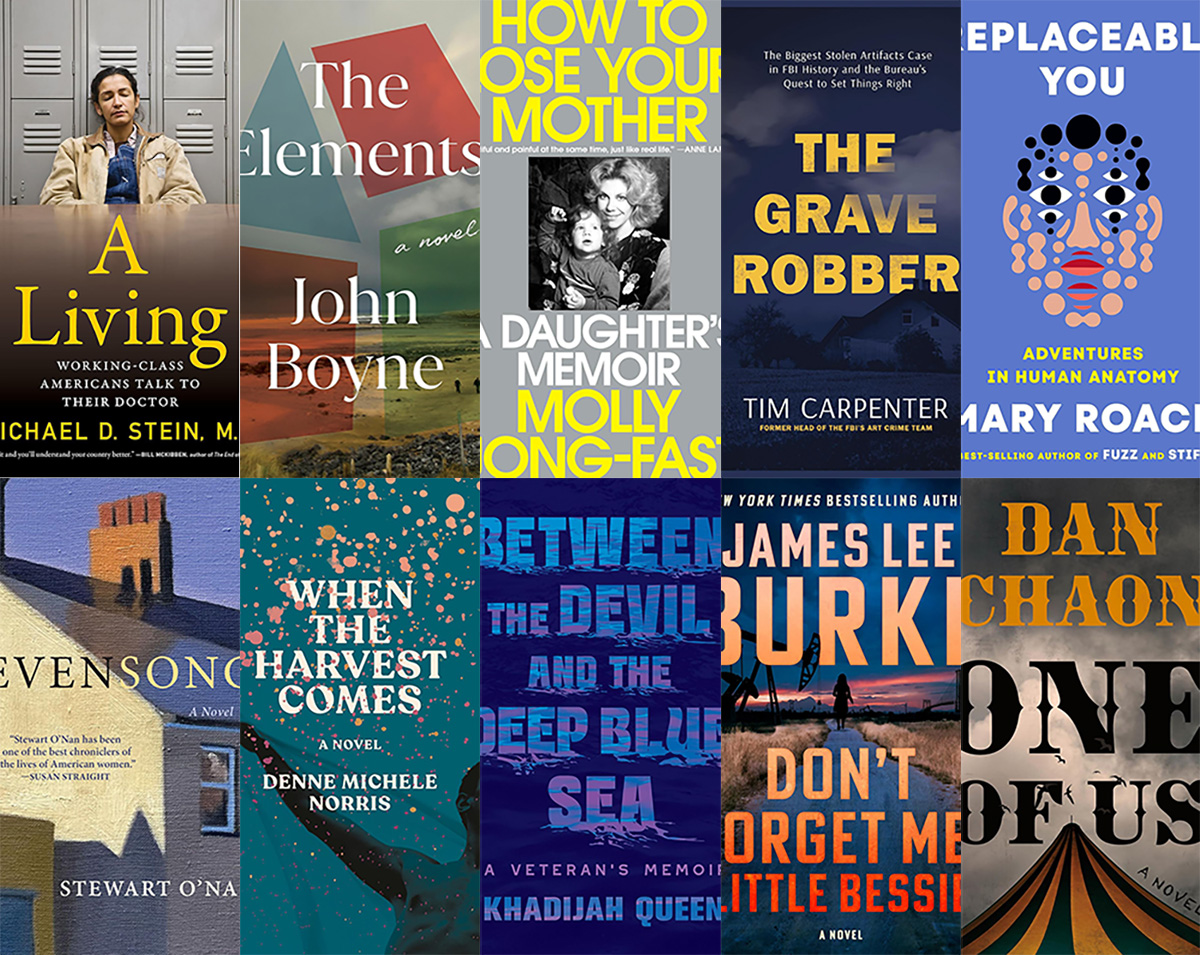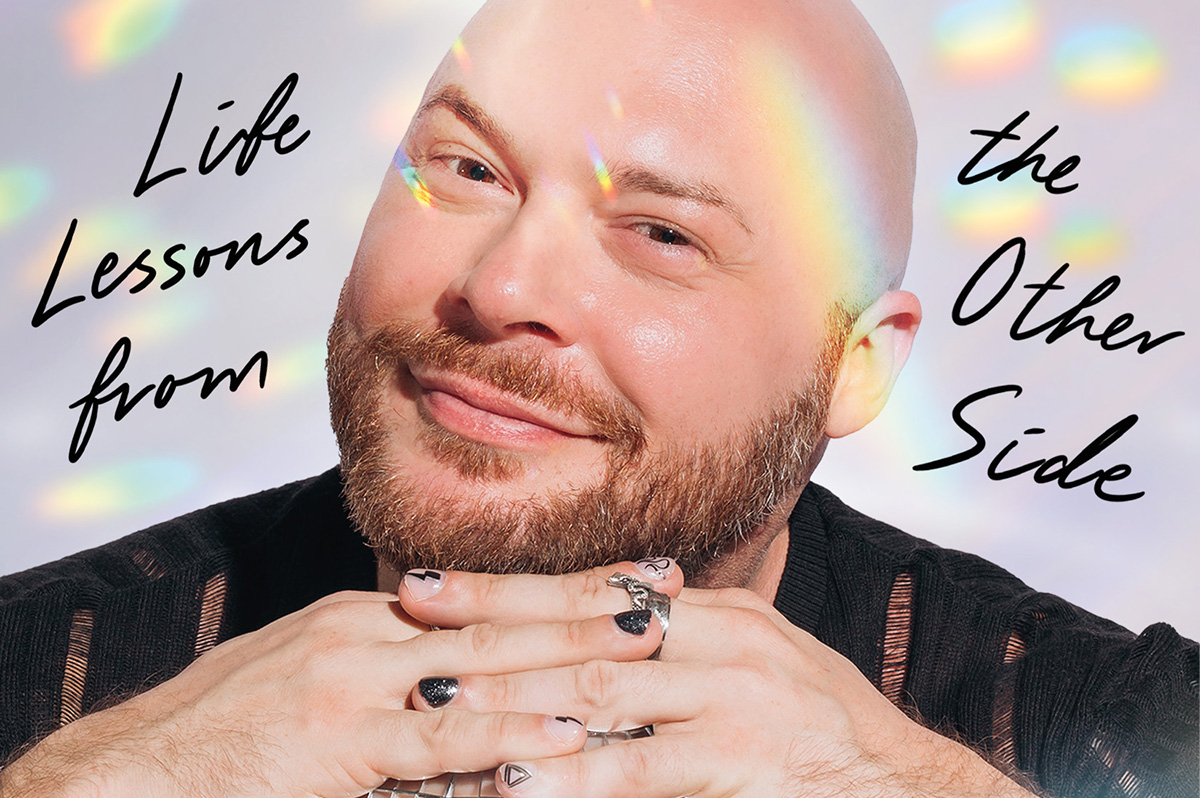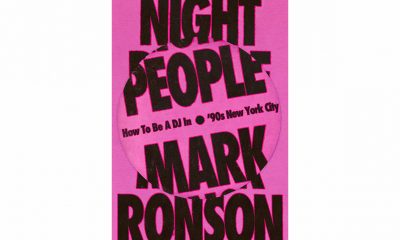Books
‘Raising Ollie’ a delightful read about raising non-binary child
Teachers will appreciate this, though it’s not a parenting book

‘Raising Ollie: How My Nonbinary Art-Nerd Kid Changed (Nearly) Everything I Know’
By Tom Rademacher
c.2021, University of Minnesota Press
$18.95/200 pages
Fill-in-the-blanks.
That’s what you get when you have a baby: unknowns. Its birthdate is often a guess, length and weight are surprises. Will it have your eyes, long fingers, Dad’s smile, Grandma’s nose? Fill in the blanks: not boy, not girl but, as in the new memoir, “Raising Ollie” by Tom Rademacher, neither, thank you.
When his daughter, Olive, was an infant, Tom Rademacher says he “struggled in those early months … to enjoy much of parenting.” There were vast amounts to learn, and little “Ollie” was a patient teacher.
As a toddler, Ollie was particularly talented in language and arts, attributes their teacher-father and therapist-mother encouraged. Early on, they were super-observant, wise, and curious about completely everything; when they were in second grade, suspicions that they were an intelligent kid were confirmed when they were labeled as an “advanced learner.”
But school was a trial, even for a uber-smart seven-year-old.
Ollie suffered from anxiety. They hated crowds and making friends and unwanted attention; they had the wit, open-mindedness, and understanding of an adult sometimes, but with little-kid coping skills. Normally a voracious lover of learning, they began to dread each school morning, and they seemed tearfully fearful of some classes and teachers. Obviously, a change in schools was needed; Ollie did their own research.
Shortly after starting third grade, Olive, who prefers “daughter” and uses they/them pronouns begun loudly, confidently, assertively identifying as a nonbinary kid.
At around this same time, their father had school issues of his own. A 2014 Minnesota Teacher of the Year, Rademacher had been unemployed due to budget cuts but was beginning a semester teaching language arts to eighth graders in northeast Minneapolis. He was also working on how to offer the best support for his students, just as he wanted for his child.
“Raising Ollie” is absolutely delightful. It’s filled with funny stories that will make you laugh. It’s a peek inside today’s classroom, with a teacher who offers relatable lessons to a notoriously tough audience of teens.
It’s also less than half about actually raising Ollie.
Author Tom Rademacher starts this memoir with a teasing warning to readers that stories are important in his family. He fulfills his promises to tell tales about his life, his parents, racism and his efforts to eliminate it in the schools where he works, and the stellar students he’s had. His stories make you want to be seated at his table at a conference and yes, he tells stories about his smart, funny, talented child who is an “art-nerd” and loves cosplay and wore girly dresses until about age seven – but just not enough.
These are sometimes-hilarious tales of a Midwestern growing-up, idyllic and happy and nostalgic, followed by a typical, angsty, identity-searching teenage-hood.
But Ollie? Just not enough. Sigh.
Teachers will adore this book. There are laughs all over the place for just about every reader who can appreciate a little self-depreciation. But if you’re looking for a parenting book about rearing a nonbinary child, “Raising Ollie” may leave you blank.

This past year, you’ve often had to make do.
Saving money here, resources there, being inventive and innovative. It’s a talent you’ve honed, but isn’t it time to have the best? Yep, so grab these Ten Best of 2025 books for your new year pleasures.
Nonfiction
Health care is on everyone’s mind now, and “A Living: Working-Class Americans Talk to Their Doctor” by Michael D. Stein, M.D. (Melville House, $26.99) lets you peek into health care from the point of view of a doctor who treats “front-line workers” and those who experience poverty and homelessness. It’s shocking, an eye-opening book, a skinny, quick-to-read one that needs to be read now.
If you’ve been doing eldercare or caring for any loved one, then “How to Lose Your Mother: A Daughter’s Memoir” by Molly Jong-Fast (Viking, $28) needs to be in your plans for the coming year. It’s a memoir, but also a biography of Jong-Fast’s mother, Erica Jong, and the story of love, illness, and living through the chaos of serious disease with humor and grace. You’ll like this book especially if you were a fan of the author’s late mother.
Another memoir you can’t miss this year is “Between the Devil and the Deep Blue Sea: A Veteran’s Memoir” by Khadijah Queen (Legacy Lit, $30.00). It’s the story of one woman’s determination to get out of poverty and get an education, and to keep her head above water while she goes below water by joining the U.S. Navy. This is a story that will keep you glued to your seat, all the way through.
Self-improvement is something you might think about tackling in the new year, and “Replaceable You: Adventures in Human Anatomy” by Mary Roach (W.W. Norton & Company, $28.99) is a lighthearted – yet real and informative – look at the things inside and outside your body that can be replaced or changed. New nose job? Transplant, new dental work? Learn how you can become the Bionic Person in real life, and laugh while you’re doing it.
The science lover inside you will want to read “The Grave Robber: The Biggest Stolen Artifacts Case in FBI History and the Bureau’s Quest to Set Things Right” by Tim Carpenter (Harper Horizon, $29.99). A history lover will also want it, as will anyone with a craving for true crime, memoir, FBI procedural books, and travel books. It’s the story of a man who spent his life stealing objects from graves around the world, and an FBI agent’s obsession with securing the objects and returning them. It’s a fascinating read, with just a little bit of gruesome thrown in for fun.
Fiction
Speaking of a little bit of scariness, “Don’t Forget Me, Little Bessie” by James Lee Burke (Atlantic Monthly Press, $28) is the story of a girl named Bessie and her involvement with a cloven-hooved being who dogs her all her life. Set in still-wild south Texas, it’s a little bit western, part paranormal, and completely full of enjoyment.
“Evensong” by Stewart O’Nan (Atlantic Monthly Press, $28) is a layered novel of women’s friendships as they age together and support one another. The characters are warm and funny, there are a few times when your heart will sit in your throat, and you won’t be sorry you read it. It’s just plain irresistible.
If you need a dark tale for what’s left of a dark winter season, then “One of Us” by Dan Chaon (Henry Holt, $28), it it. It’s the story of twins who become orphaned when their Mama dies, ending up with a man who owns a traveling freak show, and who promises to care for them. But they can’t ever forget that a nefarious con man is looking for them; those kids can talk to one another without saying a word, and he’s going to make lots of money off them. This is a sharp, clever novel that fans of the “circus” genre shouldn’t miss.
“When the Harvest Comes” by Denne Michele Norris (Random House, $28) is a wonderful romance, a boy-meets-boy with a little spice and a lot of strife. Davis loves Everett but as their wedding day draws near, doubts begin to creep in. There’s homophobia on both sides of their families, and no small amount of racism. Beware that there’s some light explicitness in this book, but if you love a good love story, you’ll love this.
Another layered tale you’ll enjoy is “The Elements” by John Boyne (Henry Holt, $29.99), a twisty bunch of short stories that connect in a series of arcs that begin on an island near Dublin. It’s about love, death, revenge, and horror, a little like The Twilight Zone, but without the paranormal. You won’t want to put down, so be warned.
If you need more ideas, head to your local library or bookstore and ask the staff there for their favorite reads of 2025. They’ll fill your book bag and your new year with goodness.
Season’s readings!
The Blade may receive commissions from qualifying purchases made via this post.
Books
This gay author sees dead people

‘Are You There Spirit? It’s Me, Travis’
By Travis Holp
c.2025, Spiegel and Grau
$28/240 pages
Your dad sent you a penny the other day, minted in his birth year.
They say pennies from heaven are a sign of some sort, and that makes sense: You’ve been thinking about him a lot lately. Some might scoff, but the idea that a lost loved one is trying to tell you he’s OK is comforting. So read the new book, “Are You There, Spirit? It’s Me, Travis” by Travis Holp, and keep your eyes open.

Ever since he was a young boy growing up just outside Dayton, Ohio, Travis Holp wanted to be a writer. He also wanted to say that he was gay but his conservative parents believed his gayness was some sort of phase. That, and bullying made him hide who he was.
He also had to hide his nascent ability to communicate with people who had died, through an entity he calls “Spirit.” Eventually, though it left him with psychological scars and a drinking problem he’s since overcome, Holp was finally able to talk about his gayness and reveal his otherworldly ability.
Getting some people to believe that he speaks to the dead is still a tall order. Spirit helps naysayers, as well as Holp himself.
Spirit, he says, isn’t a person or an essence; Spirit is love. Spirit is a conduit of healing and energy, speaking through Holp in symbolic messages, feelings, and through synchronistic events. For example, Holp says coincidences are not coincidental; they’re ways for loved ones to convey messages of healing and energy.
To tap into your own healing Spirit, Holp says to trust yourself when you think you’ve received a healing message. Ignore your ego, but listen to your inner voice. Remember that Spirit won’t work on any fixed timeline, and its only purpose is to exist.
And keep in mind that “anything is possible because you are an unlimited being.”
You’re going to want very much to like “Are You There, Spirit? It’s Me, Travis.” The cover photo of author Travis Holp will make you smile. Alas, what you’ll find in here is hard to read, not due to content but for lack of focus.
What’s inside this book is scattered and repetitious. Love, energy, healing, faith, and fear are words that are used often – so often, in fact, that many pages feel like they’ve been recycled, or like you’ve entered a time warp that moves you backward, page-wise. Yes, there are uplifting accounts of readings that Holp has done with clients here, and they’re exciting but there are too few of them. When you find them, you’ll love them. They may make you cry. They’re exactly what you need, if you grieve. Just not enough.
This isn’t a terrible book, but its audience might be narrow. It absolutely needs more stories, less sentiment; more tales, less transcendence and if that’s your aim, go elsewhere. But if your soul cries for comfort after loss, “Are You There, Spirit? It’s Me, Travis” might still make sense.
The Blade may receive commissions from qualifying purchases made via this post.
Books
‘Dogs of Venice’ looks at love lost and rediscovered
A solo holiday trip to Italy takes unexpected turn

‘The Dogs of Venice’
By Steven Crowley
c.2025, G.P. Putnam & Sons
$20/65 pages
One person.
Two, 12, 20, you can still feel alone in a crowded room if it’s a place you don’t want to be. People say, though, that that’s no way to do the holidays; you’re supposed to Make Merry, even when your heart’s not in it. You’re supposed to feel happy, no matter what – even when, as in “The Dogs of Venice” by Steven Rowley, the Christmas tinsel seems tarnished.

Right up until the plane door closed, Paul held hope that Darren would decide to come on the vacation they’d planned for and saved for, for months.
Alas, Darren was a no-show, which was not really a surprise. Three weeks before the departure, he’d announced that their marriage wasn’t working for him anymore, and that he wanted a divorce. Paul had said he was going on the vacation anyhow. Why waste a perfectly good flight, or an already-booked B&B? He was going to Venice.
Darren just rolled his eyes.
Was that a metaphor for their entire marriage? Darren had always accused Paul of wanting too much. He indicated now that he felt stifled. Still, Darren’s unhappiness hit Paul broadside and so there was Paul, alone in a romantic Italian city, fighting with an espresso machine in a loft owned by someone who looked like a frozen-food spokeswoman.
He couldn’t speak or understand Italian very well. He didn’t know his way around, and he got lost often. But he felt anchored by a dog.
The dog – he liked to call it his dog – was a random stray, like so many others wandering around Venice unleashed, but this dog’s confidence and insouciant manner inspired Paul. If a dog could be like that, well, why couldn’t he?
He knew he wasn’t unlovable but solo holidays stunk and he hated his situation. Maybe the dog had a lesson to teach him: could you live a wonderful life without someone to watch out for, pet, and care for you?
Pick up “The Dogs of Venice,” and you might think to yourself that it won’t take long to read. At under 100 pages, you’d be right – which just gives you time to turn around and read it again. Because you’ll want to.
In the same way that you poke your tongue at a sore tooth, author Steven Rowley makes you want to remember what it’s like to be the victim of a dead romance. You can do it here safely because you simply know that Paul is too nice for it to last too long. No spoilers, though, except to say that this novel is about love – gone, resurrected, misdirected – and it unfolds in exactly the way you hope it will. All in a neat evening’s worth of reading. Perfect.
One thing to note: the Christmas setting is incidental and could just as well be any season, which means that this book is timely, no matter when you want it. So grab “The Dogs of Venice,” enjoy it twice with your book group, with your love, or read it alone.
The Blade may receive commissions from qualifying purchases made via this post.
-

 National3 days ago
National3 days agoWhat to watch for in 2026: midterms, Supreme Court, and more
-

 District of Columbia5 days ago
District of Columbia5 days agoTwo pioneering gay journalists to speak at Thursday event
-

 Colombia4 days ago
Colombia4 days agoBlade travels to Colombia after U.S. forces seize Maduro in Venezuela
-

 a&e features5 days ago
a&e features5 days agoQueer highlights of the 2026 Critics Choice Awards: Aunt Gladys, that ‘Heated Rivalry’ shoutout and more




















